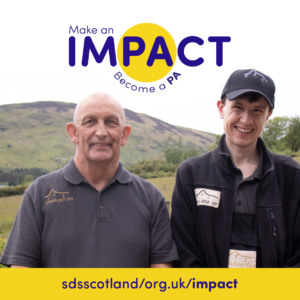Personal Assistant Newsletter September 2022

Download this PA Programme Newsletter – September 2022
Editor’s welcome
Donald Macleod, Chief Executive, SDSS
This is the third newsletter specifically for Personal Assistants to let you know about the exciting work and progress that has been made by the PA Programme Board with the essential contribution from you, the PA workforce.
This edition brings you up to date with some of the significant developments and publication of resources there have been over the summer months. As always, our main focus is to ensure PAs are fully recognised and supported as members of the social care workforce.
Work that will support PAs and encourage joint working will be showcased regularly, our web page has all the related news and documents including a new link to look in detail at the PA programme board activity, showing an interactive and more user-friendly version of our workplan.
Highlighted particularly are the resources recently launched which are outlined below, including the annual survey you contributed to and its findings, the PA Handbook and the case study videos produced as part of our awareness raising campaign.
The programme board is chaired by Ian Turner from Scottish Government, along with me, involving a wide range of people working in partnership towards efficient Self-directed Support implementation that underpins the engagement of personal assistants in Scotland. We are currently promoting the achievements made so far, with Ian and I in the middle of a series of presentations to various groups within Social Work Scotland, including e.g. older people, learning disability and autism, to ensure that the interests of all of those directing their own support is represented.
Special thanks should go to all the PAs currently engaged in this programme.
We are gradually welcoming more PAs to this work and I would encourage you to consider giving your valuable input to ensuring this workforce is valued and recognised as the vital resource it is, in supporting people’s choice and independence. There’s a range of ways PAs contribute from helping to understand issues and priorities, resource information or telling their story.
Our work together helps us offer advice to the Minister for Mental Wellbeing and Social Care, who is fully engaged with the work and attends the main board meetings regularly. If you are a PA and would like to be involved, including attending PA Programme Board meetings, please contact me on donald@sdsscotland.org.uk. (Non-salaried PAs can claim an expense for attendance at the meeting).
I hope you enjoy and find this newsletter useful and interesting.
PA Handbook Launched
The brand new online PA Handbook and refreshed PA Employer Handbook are available now and have already acquired 1,600 new users.
The PA Handbook contains a wealth of information and resources covering all aspects of a PA’s role, including:
- Training and support
- Managing your working relationships
- Dealing with employment issues
- COVID-19 information
- Self-employment or being employed as a family member
We’d love to have your feedback on the new Handbook – you can send comments on each article to let us know if there’s anything missing, or you’ve found anything helpful.
SDSS are also running a series of free, short online sessions to help people learn more about the Handbook, what it contains and how to use it. You can find details of these sessions on the Events page of the SDSS website, or contact Mark Han-Johnston if you’d like to arrange a separate session.
The Annual PA Survey
In July the report from the first annual PA Workforce survey was published.
The survey received more than 900 responses, which covered every local authority area in Scotland. The data gives a useful baseline to understand more about PAs, your work and conditions.
Some key messages from the survey were:
- PAs are most likely to be white and female, with very few under 25 years of age
- Most PAs feel proud to be a PA, love their job and have a trusting relationship with their employer
- Most PAs said they had not having received training recently, and support and flexibility is needed to accommodate commitments like unpaid care
- There was a wide range of hourly pay for PAs
The full details of the survey are available in the report on the SDSS website.
The survey has highlighted some trends and provided useful information which will now inform the development of the PA Programme Board and set its workplan and priorities. Among the issues highlighted by the survey which are expected to be prioritised are diversifying the PA workforce, focusing on parity of pay, and training for PAs.
The survey will be repeated in April 2023 to enable the PA Programme Board and the Scottish Government to track progress on issues that affect PAs and our influence in getting PAs the recognition and support they need.

Make an imPAct Campaign
Make an ImPAct is the awareness campaign aimed at encouraging more people to consider becoming a Personal Assistant.
Launched in July, the campaign features video stories of PA Employers, PAs and family members, highlighting the unique role of the PA, the benefits of working directly for an employer, and the value PAs bring.
The campaign has been shared on social media and has a dedicated page on the SDS Scotland website, featuring the video clips and directing people to the PA recruitment page on the MyJobScotland website.
If you’d like to help spread the campaign, please consider sharing posts from the SDSS Facebook, Twitter or LinkedIn pages.
The next steps with the campaign are to progress it in mainstream media channels to influence understanding of the importance of the role and improve recruitment.
Social Care Worker Death in Service Payment Scheme
On 30 July 2020 Scottish Ministers published details of the social care worker death in service payment scheme.
The scheme provides a one-off payment of £60,000 to dependents or the next of kin of a social care worker who has died in service as a result of, or the suspected result of, contracting Covid-19 at work. This payment is independent of any life assurance cover that may have been provided by an employer or through a pension scheme.
The scheme is open to survivors of staff who worked in a social care setting (including Personal Assistants), regardless of their role or length of service. The Scottish Government encourage anyone who thinks they may be entitled to this payment to apply.
The Scheme will make payments for eligible claims in respect of coronavirus related deaths occurring between 17 March 2020 and 30 June 2022. Claims will be considered up until 30 June 2023. Applications to the scheme are made by employers. If you know a survivor of a social care worker who has died in service, please can you share this communication with them.
Full guidance on the scheme and information on the application process can be found on the Scottish Government website at: https://www.gov.scot/publications/coronavirus-covid-19-social-care-worker-death-in-service-payment/pages/overview/.
National Care Service
The Scottish Government are hosting a forum event on 3 October to share information and hear views about the National Care Service.
The event will be an opportunity to discuss:
- what the NCS is
- why it matters so much
- what people need from the NCS
The National Care Service Forum is open to everyone, including:
- people who access community health and social care services
- the social care workforce
- carers and unpaid carers
- professionals working across the public, private and third sector with specific policy interests in the NCS.
To find out more and a book space at the free event, visit the event page for more information.
PA Programme Board Web Page and Subgroups
A reminder that the dedicated PA Programme Board web page is where you can find all information about the ongoing work of the Board and its subgroups (including meeting minutes), as well as resources and news updates.
The subgroups are at a pivotal stage in their development. Several have now achieved their original objectives and, having established future and ongoing need, are now at the stage where they are planning objectives for the next year. For example, the recruitment subgroup, having established a myjobscotland page for PA jobs, is considering workforce planning, ongoing awareness raising and recruitment of banks of PAs for relief work. The Annual Personal Assistant Workforce Survey report produced by the Communications group has given us some robust data which will inform this work. The PA Pathfinder group is currently exploring ways of establishing peer support groups for PAs, with a particular emphasis on rural areas, where PAs can experience isolation. Subgroups about to commence their work include one led by Social Work Scotland exploring the potential for a National Direct Payment Agreement aimed at reducing the variation in implementation across the country; The PA Wellbeing subgroup is also about to explore how this important aspect of the PA role is supported, in line with the rest of the social care workforce.
Involvement is needed by PAs across all areas, experiences and capacities, it’s so important you have the opportunity to be involved in work to support you.
If you are interested in any of these subgroups or in taking part in the main Programme Board, please contact me on donald@sdsscotland.org.uk,
Other news – quick snapshot
- SDSS Chief Executive Donald Macleod joined an In Control Scotland webinar on challenges in social care recruitment, discussing Personal Assistants
- Personals Assistants in the news: Disabled people fear shortage of personal assistants and the loss of independence (BBC)


